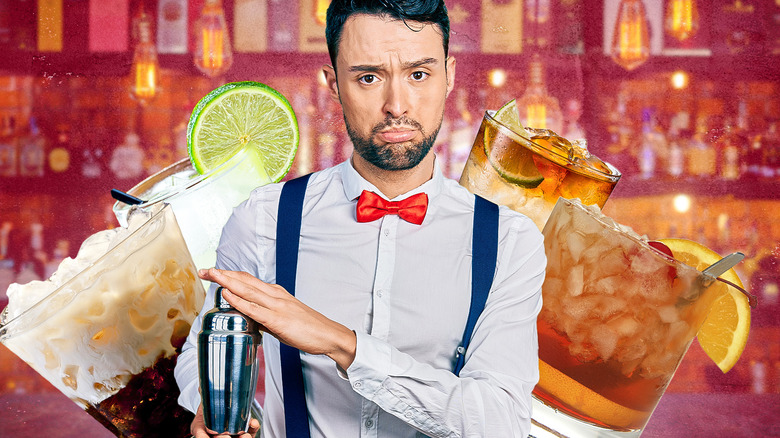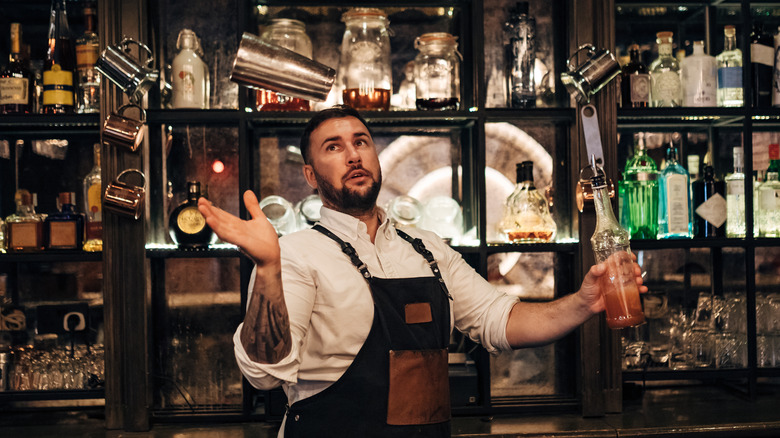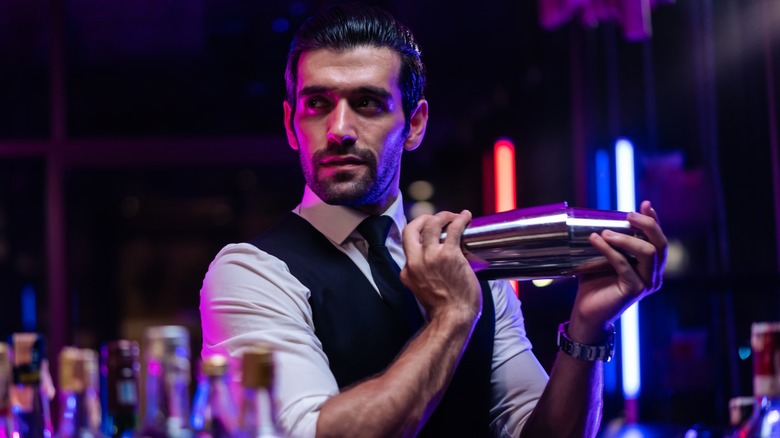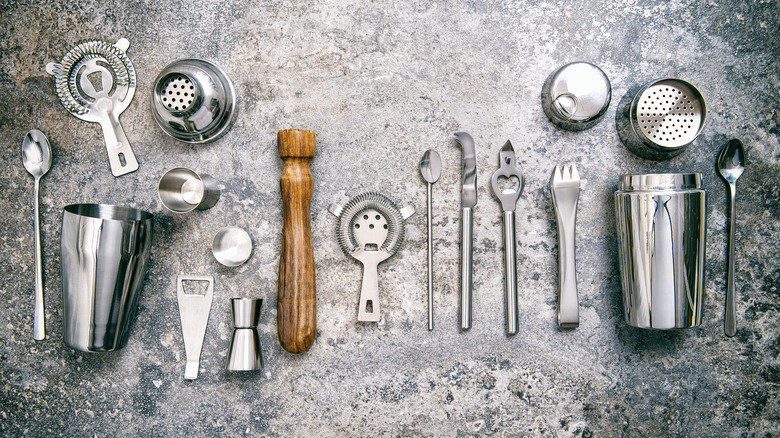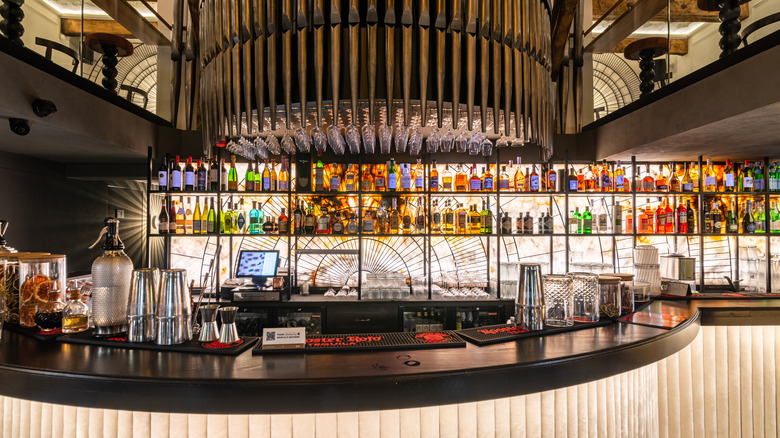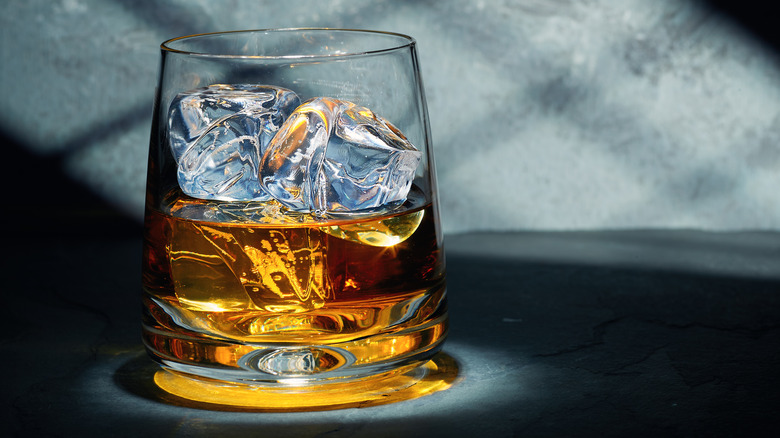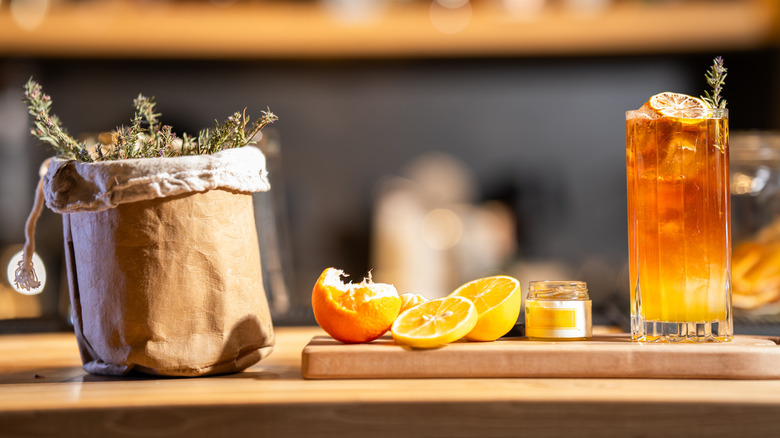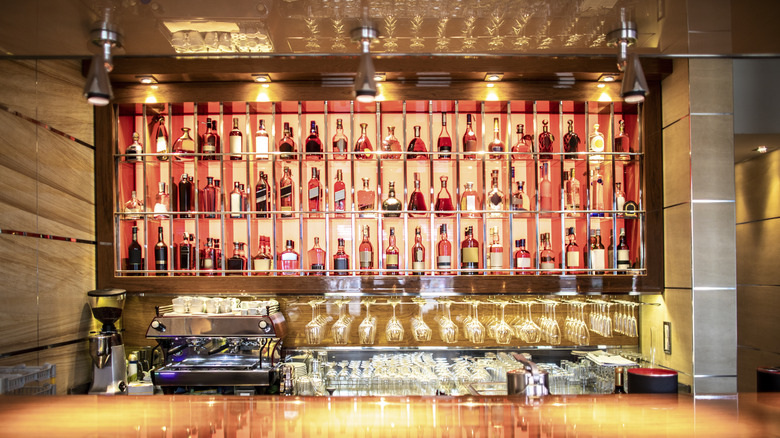8 Signs Your Bartender Is Probably Not Making Your Cocktail Correctly
Every time you go out with friends to get a drink or two, you risk encountering all kinds of bummers: bad music, bad pick-up lines, and perhaps worst of all, bad cocktails. As consumers and drink aficionados, we can't all be experts, but we can tell when a drink is good and when we could have saved ourselves the $14.
To pinpoint some bartending red flags that you should look for on your next evening out, we enlisted the help of Axel Pimentel, a Mexico City bartender whose career has included stints at some of the most prestigious bars in town, including beloved spots like Licorería Limantour and Fifty Mils. These days, Pimentel is the Corporate Bartender at Casa Pedro Domecq, where he works with the Remy Martin portfolio and leads the educational program Domecq Academy. When he's not teaching industry fellows or amateur bartenders how to shake the perfect cocktail, he's helping us avoid poorly mixed drinks. Here are eight signs that your bartender may be making a mixology faux pas.
Your bartender is multitasking
Preparing a great drink requires not just a certain degree of talent and skill, but also time and concentration. Axel Pimentel warned Tasting Table about bartenders who are performing several tasks at once, such as working in the kitchen or playing host at the entrance.
"I like to see the bartender take their time when they're preparing the drink and dedicate their time only to the bar," Pimentel explained. "If they're distracted, or if they're working in other areas of the bar or the restaurant, I don't like that." As just one example, a multitasking bartender who's also working the grill might not be an expert at preparing cocktails. Alternatively, they simply may not have the time and energy required to prepare a flawless martini — much less a more obscure cocktail like one of these underrated drinks you should be ordering at a bar — since they're likely responsible for many different tasks throughout their shift.
Their technique is questionable
Arguably, all that matters when making a cocktail is that you combine the proper ingredients in a glass. After all, everything is just going to end up mixed in there anyway, right? Well, that would actually be wrong. Technique is everything, according to Axel Pimentel.
You have to make sure "that they're using the correct technique for each kind of drink," he told Tasting Table. For example, if you ordered a shaken drink (which is distinct from a stirred drink), then according to Pimentel, the bartender should shake it for at least 12 seconds to ensure that the ingredients are well-mixed inside the shaker. He also pointed out that he prefers bartenders who shake one drink at a time, as this allows each cocktail to reach its ideal temperature.
Speaking of temperature, Pimentel warned us about bartenders who leave ice in your glass while they're busy shaking or mixing your drink. "It starts to melt," he said. "I like to see a bartender serve the ice right when they're about to pour the drink."
They don't have the right tools
Like any professional, a great bartender needs the right tools for their craft. Axel Pimentel told Tasting Table that you should watch out for those who are using the wrong ones. "If the bartender has mismatched shakers or the wrong strainer, or perhaps they brought a soup spoon from the kitchen, that's a red flag," he declared. The jigger, he explained, is a basic for measuring. "Recipes are important, but if you don't have the measuring tools, you can't prepare it right, and you can't get the same result every time you prepare the drink," he said. And, of course, the bartender has to ensure not only that these tools are in good condition, but that they're also washing them throughout their shift.
Pimentel also mentioned the importance of using the right glassware, especially if you're at a cocktail bar. Did you get a Negroni in a coupé glass? Yeah, that might be a warning sign. Lastly, he pointed out something he's a huge fan of: bartenders who bring their own equipment to work. (If you happen to be an aspiring mixologist, check out these bartending tools for your home bar.)
They ignore neatness and presentation
It's always nice to know that whatever you're drinking came from a clean preparation area, so while you're waiting for your order, take a good look at the bar. "The bar has to be neat," Axel Pimentel told Tasting Table. Sometimes, he warned, it may look nice and clean from where you're sitting, but if you take a look behind the bar itself, you might see unpleasant sights like sticky floors, puddles, or unwashed glassware. "That's alarming," he declared, sharing that some places might just rinse off a glass after a guest finishes their drink rather than fully washing it before using it for another customer. Ew.
The same rules of hygiene apply to your bartender's personal presentation. "Uniforms are not mandatory, but you at least want a good, neat presentation," Pimentel said. Take a quick survey of whoever's making your drink: "They have to have clean hands and fingernails," he said. "Sometimes they wear gloves but the gloves are dirty."
They use poor-quality ice
The right temperature is absolutely essential for a good cocktail. After you order your drink, when you're watching the magic happen behind the bar, it's important to take notice of the kind of ice going into your cocktail. Ice that's straight from the fridge tends to dilute quickly and can affect the taste of your drink by watering it down. Ideally, your bar will offer clear ice, which it either gets from a gourmet supplier or produces in-house.
"Some bars have people that focus on making the ice," confirmed Axel Pimentel. In addition to his warning about bartenders letting the ice melt in your glass while they prepare your drink, he also highlighted another capital sin: using the same ice to mix and cool your cocktail. "They can't use the same ice to mix [that they use] for your actual drink," he said. Something he highlighted as a positive, though, is when bars have a fridge stocked with chilled glassware, ensuring a lovely, perfectly icy cocktail upon request.
Their ingredients aren't well-displayed
Some bars are minimalist and display only a few strategically placed bottles on an otherwise sleek bar. Other establishments showcase hundreds of bottles and memorabilia. Each bar has its own style, and that's why we love them. It's important, however, that as a customer, you have a clear view of what you're being served, particularly where cocktails are concerned.
"Ingredients are key," Alex Pimentel told Tasting Table. You want to make sure that your bartender is using bottles with pourers, that they're refrigerating the ingredients that need to be chilled, and that they're washing whatever needs to be washed. Speaking about oranges, limes, and other produce at the bar, Pimentel said, "I hate it when they have them with those little tags still on." Also, if the bartender prepares any cocktails using egg whites, the eggs should be pasteurized and refrigerated. "People at specialized bars like to see what ingredients are going into their drinks," Pimentel pointed out. "Even at high-volume bars where they make pre-batch cocktails, you want to know that they're preparing them well."
They don't know their spirits or recipes
One of the best parts of interacting with a bartender is asking them questions. Can you tell me about that bottle over there? What should I drink tonight if I like gin? Is this cocktail good if I switch the vodka to tequila? And so on.
"Your bartender should be well informed about the ingredients they are using, what the inspiration behind the cocktails they are serving is, and the spirits the bar offers," Axel Pimentel told us. "They should be well-versed in brands, as well — where the bottles come from, what makes each brand different." A bartender who seems doubtful or, even worse, seems like they're making things up as they go likely won't prepare you a great drink just a few minutes later. Pimentel also said that a good bartender should be open to changes. If you ask them to use a different brand or a different spirit, they should be willing to experiment, as this is a testament to their creativity. For example, try asking your bartender for the best drink they can make — the results may surprise you.
They don't seem to enjoy working behind the bar
The cranky, rude bartender is a bad cliché — hospitality is part of the job. Sure, some bars might get crowded at times, and it might take a few tries to get their attention, but interacting with your bartender should never be unpleasant. "I think bartenders should be enjoying themselves," Axel Pimentel told Tasting Table. "The bar is a strategic place. You see the kitchen, you see the tables, you see it all. You have control of the space, and I love it when bartenders are aware of that." He also added that bartenders get bonus points when they create their own drinks and seem excited for guests to try them. "That shows that they're passionate about their job."
During his time at Mexico City's Fifty Mils, which is located inside the Four Seasons, Pimentel learned plenty about hospitality. "I learned how to remember guests' names, remember their favorite drinks, make eye contact, suggest drinks depending on their preferences, and when to offer them another one. You can tell when someone has that kind of training," he pointed out.
